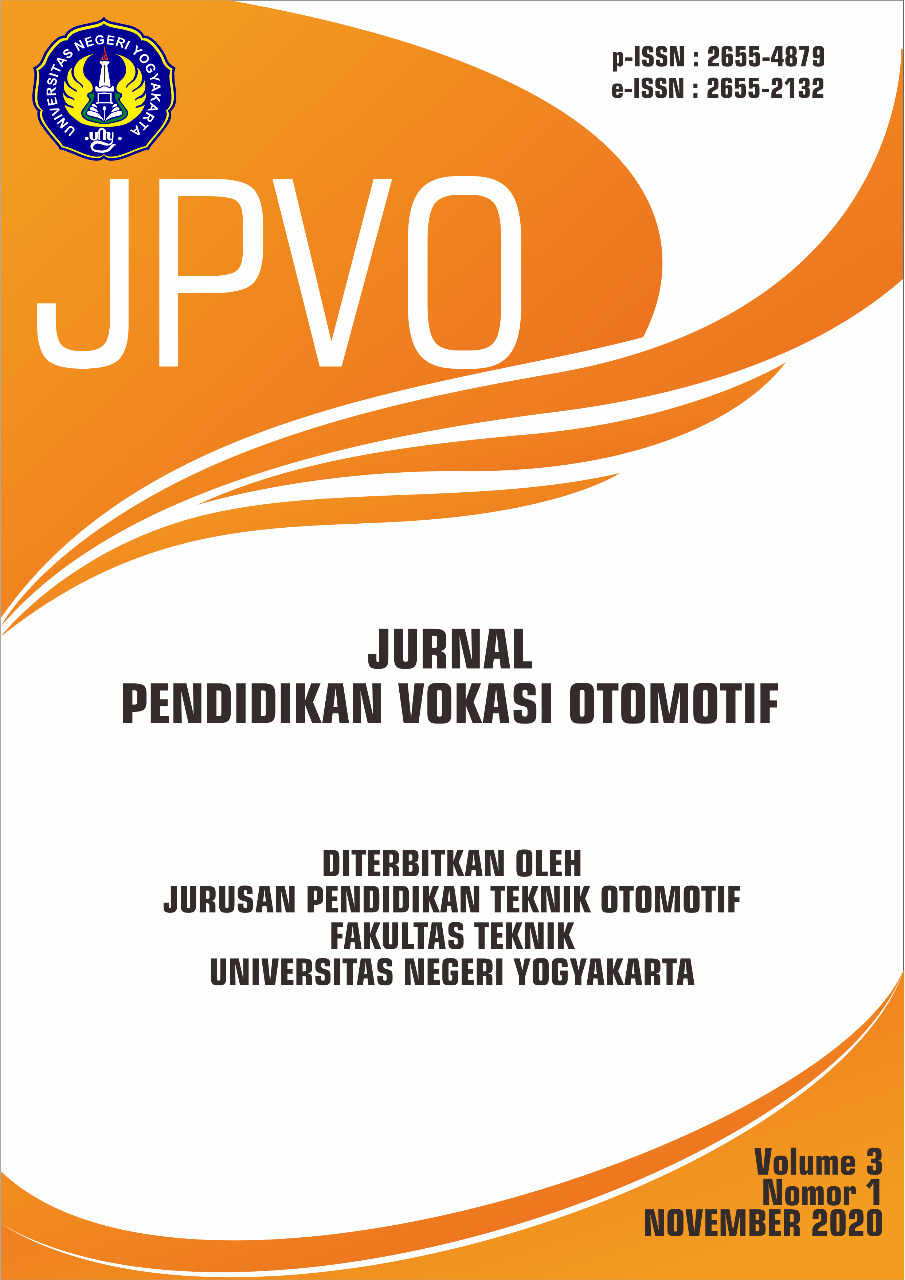PERSEPSI INSTRUKTUR INDUSTRI TERHADAP PELATIHAN JARAK JAUH MENGGUNAKAN LEARNING MANAGEMENT SYSTEM
DOI:
https://doi.org/10.21831/jpvo.v6i1.66174Keywords:
Instruktur, Learning Management System, Pelatihan, IndustriAbstract
References
Aldiab, A., Chowdhury, H., Kootsookos, A., Alam, F., & Allhibi, H. (2019). Utilization of Learning Management Systems (LMSs) in higher education system: A case review for Saudi Arabia. Energy Procedia, 160. https://doi.org/10.1016/j.egypro.2019.02.186
BaÅŸaran, S., & Mohammed, R. K. H. (2020). Usability evaluation of open source learning management systems. International Journal of Advanced Computer Science and Applications, 11(6), 400–410. https://doi.org/10.14569/IJACSA.2020.0110652
BeneÅ¡ová, A., & Tupa, J. (2017). Requirements for Education and Qualification of People in Industry 4.0. Procedia Manufacturing, 11. https://doi.org/10.1016/j.promfg.2017.07.366
Bradley, V. M. (2020). Learning Management System (LMS) Use with Online Instruction. International Journal of Technology in Education, 4(1). https://doi.org/10.46328/ijte.36
Braun, V., & Clarke, V. (2006). Using thematic analysis in psychology. Qualitative Research in Psychology, 3(2). https://doi.org/10.1191/1478088706qp063oa
Eraslan Yalcin, M., & Kutlu, B. (2019). Examination of students' acceptance of and intention to use learning management systems using extended TAM. British Journal of Educational Technology, 50(5). https://doi.org/10.1111/bjet.12798
Kakasevski, G., Mihajlov, M., Arsenovski, S., & Chungurski, S. (2008). Evaluating usability in learning management system moodle. Proceedings of the International Conference on Information Technology Interfaces, ITI. https://doi.org/10.1109/ITI.2008.4588480
Lwande, C., Muchemi, L., & Oboko, R. (2021). Identifying learning styles and cognitive traits in a learning management system. Heliyon, 7(8). https://doi.org/10.1016/j.heliyon.2021.e07701
Meylani, R., Bitter, G., & Legacy, J. (2015). Desirable Characteristics of an Ideal Online Learning Environment. Journal of Educational and Social Research. https://doi.org/10.5901/jesr.2015.v5n1p203
Omar, U., & Yaacob, A. (2020). The Benefits Of Learning Management System (LMS) in Facilitating The Tesl Teacher Trainees' Learning. Practitioner Research, 2. https://doi.org/10.32890/pr2020.2.6
Raza, S. A., Qazi, W., Khan, K. A., & Salam, J. (2021). Social Isolation and Acceptance of the Learning Management System (LMS) in the time of COVID-19 Pandemic: An Expansion of the UTAUT Model. Journal of Educational Computing Research, 59(2). https://doi.org/10.1177/0735633120960421
Shahroom, A. A., & Hussin, N. (2018). Industrial Revolution 4.0 and Education. International Journal of Academic Research in Business and Social Sciences, 8(9). https://doi.org/10.6007/ijarbss/v8-i9/4593
Technical Training Pathway Overview. (n.d.).
Vanek, J., Simpson, D., Johnston, J., & Petty, L. I. (n.d.). IDEAL Distance Education and Blended Learning Handbook. http://www2.ed.gov/about/offices/list/ovae/pi/AdultEd/index.html?exp=
Downloads
Published
How to Cite
Issue
Section
Citation Check
License
Jurnal Pendidikan Vokasi Otomotif allows readers to read, download, copy, distribute, print, search, or link to the full texts of its articles and allow readers to use them for any other lawful purpose. The journal allows the author(s) to hold the copyright without restrictions. Finally, the journal allows the author(s) to retain publishing rights without restrictions

Jurnal Pendidikan Vokasi Otomotif is licensed under a Creative Commons Attribution-ShareAlike 4.0 International License.
Based on a work at https://journal.uny.ac.id/index.php/jpvo.









